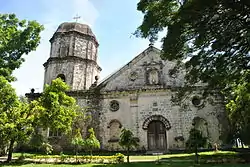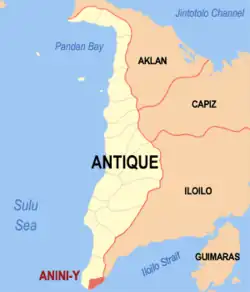Anini-y | |
|---|---|
| Municipality of Anini-y | |
 Anini-y Church | |
 Flag  Seal | |
| Anthem: Anini-y, Banwang Pinili (unofficial) | |
 Map of Antique with Anini-y highlighted | |
OpenStreetMap | |
.svg.png.webp) Anini-y Location in the Philippines | |
| Coordinates: 10°25′57″N 121°55′31″E / 10.432475°N 121.925286°E | |
| Country | Philippines |
| Region | Western Visayas |
| Province | Antique |
| District | Lone district |
| Barangays | 23 (see Barangays) |
| Government | |
| • Type | Sangguniang Bayan |
| • Mayor | Maxfil B. Pollicar |
| • Vice Mayor | Atty: Jorrey T. Sampior |
| • Representative | Antonio Agapito "AA Legarda" Bautista Legarda Jr. |
| • Municipal Council | Members |
| • Electorate | 14,197 voters (2022) |
| Area | |
| • Total | 66.17 km2 (25.55 sq mi) |
| Elevation | 14 m (46 ft) |
| Highest elevation (Mount Paluli-an) | 404 m (1,325 ft) |
| Lowest elevation | 0 m (0 ft) |
| Population (2020 census)[3] | |
| • Total | 22,018 |
| • Density | 330/km2 (860/sq mi) |
| • Households | 5,466 |
| Economy | |
| • Income class | 4th municipal income class |
| • Poverty incidence | 18.76 |
| • Revenue | ₱ 96.5 million (2020) |
| • Assets | ₱ 123.9 million (2020) |
| • Expenditure | ₱ 94.48 million (2020) |
| • Liabilities | ₱ 40.25 million (2020) |
| Service provider | |
| • Electricity | Antique Electric Cooperative (ANTECO) |
| Time zone | UTC+8 (PST) |
| ZIP code | 5717 |
| PSGC | |
| IDD : area code | +63 (0)36 |
| Native languages | Karay-a Ati Hiligaynon Tagalog |
| Major religions | Roman Catholic, Iglesia Filipina Independiente |
| Local feast | Urukay Festival |
| Catholic diocese | Diocese of San Jose de Buenavista |
| Patron saint |
|
Anini-y, officially the Municipality of Anini-y (Kinaray-a: Banwa kang Anini-y; Hiligaynon: Banwa sang Anini-y; Tagalog: Bayan ng Anini-y), is a 4th class municipality in the province of Antique, Philippines. According to the 2020 census, it has a population of 22,018 people.[3] Making it 14th most populous municipality in the province of Antique.
History
During the Spanish era, Anini-y was already an independent town with a Baroque church located on the heart of its town proper. Sometime during the American period, Anini-y was integrated into the municipality of Tobias Fornier (formerly Dao). On August 5, 1949, the town of Anini-y became independent again from the municipality of Tobias Fornier.
Geography
Anini-y is the southernmost municipality of the province and is about 40 kilometres (25 mi) from the provincial capital, San Jose de Buenavista.
According to the Philippine Statistics Authority, the municipality has a land area of 66.17 square kilometres (25.55 sq mi) [5] constituting 2.42% of the 2,729.17-square-kilometre- (1,053.74 sq mi) total area of Antique.
Climate
| Climate data for Anini-y, Antique | |||||||||||||
|---|---|---|---|---|---|---|---|---|---|---|---|---|---|
| Month | Jan | Feb | Mar | Apr | May | Jun | Jul | Aug | Sep | Oct | Nov | Dec | Year |
| Mean daily maximum °C (°F) | 30 (86) |
31 (88) |
32 (90) |
33 (91) |
32 (90) |
30 (86) |
29 (84) |
29 (84) |
29 (84) |
29 (84) |
30 (86) |
30 (86) |
30 (87) |
| Mean daily minimum °C (°F) | 21 (70) |
21 (70) |
22 (72) |
23 (73) |
25 (77) |
25 (77) |
25 (77) |
25 (77) |
24 (75) |
24 (75) |
23 (73) |
22 (72) |
23 (74) |
| Average precipitation mm (inches) | 19 (0.7) |
17 (0.7) |
26 (1.0) |
37 (1.5) |
119 (4.7) |
191 (7.5) |
258 (10.2) |
260 (10.2) |
248 (9.8) |
196 (7.7) |
97 (3.8) |
39 (1.5) |
1,507 (59.3) |
| Average rainy days | 7.2 | 5.2 | 8.3 | 11.9 | 22.3 | 26.5 | 28.3 | 28.2 | 27.3 | 26.4 | 18.7 | 11.8 | 222.1 |
| Source: Meteoblue[6] (Use with caution: this is modeled/calculated data, not measured locally.) | |||||||||||||
Barangays
Anini-y is politically subdivided into 23 barangays.[7] Each barangay consists of puroks and some have sitios.
The barrio of San Ramón was formerly the sitio of Igdacoton in the barrio of Magdalena.[8]

| PSGC | Barangay | Population | ±% p.a. | |||
|---|---|---|---|---|---|---|
| 2020[3] | 2010[9] | |||||
| 060601001 | Bayo Grande | 3.0% | 670 | 655 | 0.23% | |
| 060601002 | Bayo Pequeño | 2.7% | 600 | 574 | 0.44% | |
| 060601004 | Butuan | 6.1% | 1,352 | 1,347 | 0.04% | |
| 060601005 | Casay, Anini-y | 5.2% | 1,134 | 1,176 | −0.36% | |
| 060601006 | Casay Viejo | 1.9% | 421 | 374 | 1.19% | |
| 060601007 | Iba | 5.1% | 1,119 | 1,081 | 0.35% | |
| 060601008 | Milagrosa (Igbarabatuan) | 1.7% | 371 | 344 | 0.76% | |
| 060601009 | Igpalge | 2.8% | 612 | 632 | −0.32% | |
| 060601010 | Igtumarom | 1.9% | 423 | 417 | 0.14% | |
| 060601011 | Lisub A | 3.6% | 801 | 868 | −0.80% | |
| 060601012 | Lisub B | 5.4% | 1,184 | 896 | 2.83% | |
| 060601013 | Mabuyong | 6.3% | 1,385 | 1,361 | 0.17% | |
| 060601014 | Magdalena | 9.8% | 2,168 | 2,127 | 0.19% | |
| 060601015 | Nasuli C | 2.9% | 645 | 533 | 1.93% | |
| 060601016 | Nato | 4.5% | 999 | 963 | 0.37% | |
| 060601017 | Poblacion | 3.6% | 789 | 754 | 0.45% | |
| 060601018 | Sagua | 5.2% | 1,150 | 1,124 | 0.23% | |
| 060601019 | Salvacion | 3.4% | 750 | 736 | 0.19% | |
| 060601020 | San Francisco (Dapdap) | 6.3% | 1,378 | 1,363 | 0.11% | |
| 060601021 | San Ramon | 1.7% | 368 | 337 | 0.88% | |
| 060601022 | San Roque | 5.8% | 1,277 | 1,137 | 1.17% | |
| 060601023 | Tagaytay | 1.2% | 264 | 257 | 0.27% | |
| 060601024 | Talisayan | 6.1% | 1,341 | 1,293 | 0.37% | |
| Total | 22,018 | 20,349 | 0.79% | |||
Demographics
| Year | Pop. | ±% p.a. |
|---|---|---|
| 1903 | 4,541 | — |
| 1960 | 8,792 | +1.17% |
| 1970 | 11,590 | +2.80% |
| 1975 | 11,740 | +0.26% |
| 1980 | 13,480 | +2.80% |
| 1990 | 16,851 | +2.26% |
| 1995 | 18,657 | +1.93% |
| 2000 | 19,623 | +1.09% |
| 2007 | 20,097 | +0.33% |
| 2010 | 20,349 | +0.45% |
| 2015 | 21,201 | +0.78% |
| 2020 | 22,018 | +0.75% |
| Source: Philippine Statistics Authority[10][9][11][12] | ||
In the 2020 census, Anini-y had a population of 22,018.[3] The population density was 330 inhabitants per square kilometre (850/sq mi).
Economy
Tourism
- Cresta de Gallo — a mountain with a shape like a rooster's crown.
- Aliwliw - the highest mountain in Anini-y located along Anini-y and Tobias Fornier border.
- Iboc River and Nasuli River - two longest rivers in Anini-y
- Nogas Island — according to local legend, this Island was formed when the two lovers Anini and Nogas had broken their promises with the fairy God Mother. While riding on a boat near the town, their boat was capsized by big waves summoned by the fairy God Mother. After which, at the spot where Nogas and Anini were last seen, a white sand island full of mangroves appeared just near beside the Anini-y town.
- Siraan Hot Spring and Health Resort — People who reside near Siraan hot spring usually take their time relaxing in a bath tub sized pool early in the morning to feel the warmness and the cool breeze of the ocean as the resort is located just along the seashore.
- San Juan Nepomuceno Parish Church or Anini-y Church — built during the Spanish era in the 19th century. The church is made of coral reefs carved into thick blocks to form an adobe and were glued using thousands of egg whites/yolks. Early locals/settlers of the town were the prime workers and carpenters of the church. Some stories tell that people of the town were forced to contribute anything such as goods and food for the Spanish priest as well as raising chicken to lay more eggs so that it will be used for building of the church.
- Bantigue Marine Sanctuary — a marine reef and sanctuary situated on the western coast of Barangay San Francisco (Dapdap). This site is the future of local tourism of the barrio.
References
- ↑ Municipality of Anini-y | (DILG)
- ↑ "2015 Census of Population, Report No. 3 – Population, Land Area, and Population Density" (PDF). Philippine Statistics Authority. Quezon City, Philippines. August 2016. ISSN 0117-1453. Archived (PDF) from the original on May 25, 2021. Retrieved July 16, 2021.
- 1 2 3 4 Census of Population (2020). "Region VI (Western Visayas)". Total Population by Province, City, Municipality and Barangay. Philippine Statistics Authority. Retrieved 8 July 2021.
- ↑ "PSA Releases the 2018 Municipal and City Level Poverty Estimates". Philippine Statistics Authority. 15 December 2021. Retrieved 22 January 2022.
- ↑ "Province: Antique". PSGC Interactive. Quezon City, Philippines: Philippine Statistics Authority. Retrieved 12 November 2016.
- ↑ "Anini-y: Average Temperatures and Rainfall". Meteoblue. Retrieved 1 May 2020.
- ↑ "Municipal: Anini-y". PSGC Interactive. Quezon City, Philippines: Philippine Statistics Authority. Retrieved 8 January 2016.
- ↑ "Republic Act No. 1661; An Act Converting the Sitio of Igdacoton in the Barrio of Magdalena, Municipality of Anini-y, Province of Antique, into a Barrio to be Known as the Barrio of San Ramon". The Corpus Juris. 20 June 1957. Archived from the original on 30 October 2016. Retrieved 30 October 2016.
- 1 2 Census of Population and Housing (2010). "Region VI (Western Visayas)" (PDF). Total Population by Province, City, Municipality and Barangay. National Statistics Office. Retrieved 29 June 2016.
- ↑ Census of Population (2015). "Region VI (Western Visayas)". Total Population by Province, City, Municipality and Barangay. Philippine Statistics Authority. Retrieved 20 June 2016.
- ↑ Censuses of Population (1903–2007). "Region VI (Western Visayas)". Table 1. Population Enumerated in Various Censuses by Province/Highly Urbanized City: 1903 to 2007. National Statistics Office.
{{cite encyclopedia}}: CS1 maint: numeric names: authors list (link) - ↑ "Province of Antique". Municipality Population Data. Local Water Utilities Administration Research Division. Retrieved 17 December 2016.
- ↑ "Poverty incidence (PI):". Philippine Statistics Authority. Retrieved December 28, 2020.
- ↑ "Estimation of Local Poverty in the Philippines" (PDF). Philippine Statistics Authority. 29 November 2005.
- ↑ "2003 City and Municipal Level Poverty Estimates" (PDF). Philippine Statistics Authority. 23 March 2009.
- ↑ "City and Municipal Level Poverty Estimates; 2006 and 2009" (PDF). Philippine Statistics Authority. 3 August 2012.
- ↑ "2012 Municipal and City Level Poverty Estimates" (PDF). Philippine Statistics Authority. 31 May 2016.
- ↑ "Municipal and City Level Small Area Poverty Estimates; 2009, 2012 and 2015". Philippine Statistics Authority. 10 July 2019.
- ↑ "PSA Releases the 2018 Municipal and City Level Poverty Estimates". Philippine Statistics Authority. 15 December 2021. Retrieved 22 January 2022.
External links
![]() Media related to Anini-y at Wikimedia Commons
Media related to Anini-y at Wikimedia Commons